Blogs
How to calculate WACC and transfer shares from EDIS in Meroshare?
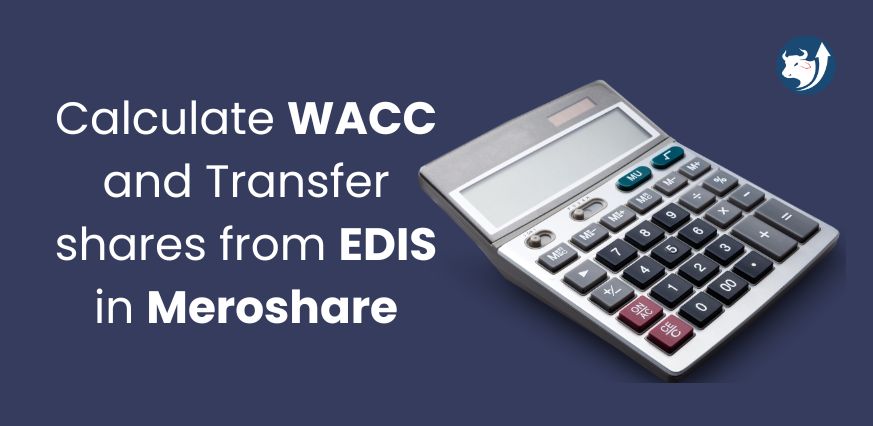
After selling the share you have to transfer those shares to the buyer with the help of a broker. You have to calculate WACC before transferring the sold shares to the buyer. Only after completing WACC can you perform EDIS to transfer the shares. Before the launch of MeroShare, people had to visit the broker’s office to perform EDIS. Now, with MeroShare, you can perform EDIS online. In this blog, you will learn to calculate WACC and transfer shares from EDIS in Meroshare i.e. how to Transfer Shares to Buyers from Mero Share.
Why do you need to calculate WACC and perform EDIS?
Settling the collateral in your TMS account after buying shares from the secondary market is essential. Similarly, when you sell shares, you must perform WACC and EDIS. If you fail, you might have to pay a fine of up to 20%.
You need to pay a certain percentage of tax on the profit you’ve made to the government. By calculating WACC, you’ll know the amount of tax you should pay, which depends on factors like how long you hold the share and its buying price. If you sell a stock at a loss, you’re not required to pay any tax.
How to calculate WACC in Meroshare?
Follow the given steps to calculate WACC in Meroshare:
Step 1: Log in to your MeroShare account.
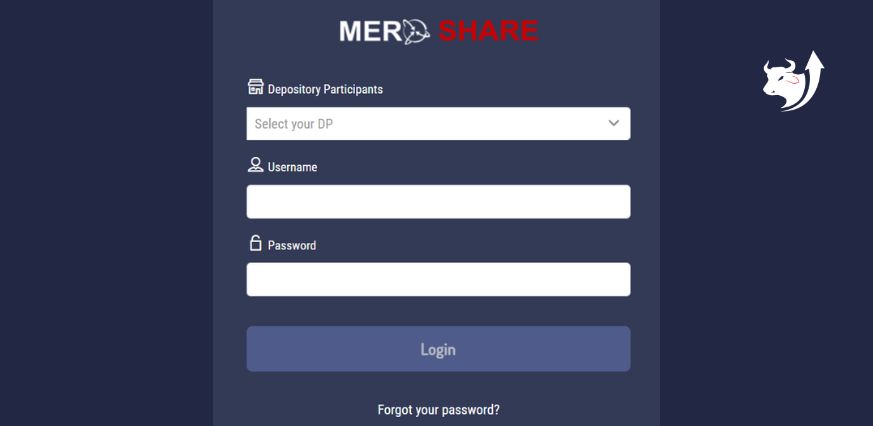
Step 2: Go to ‘My purchase Source’
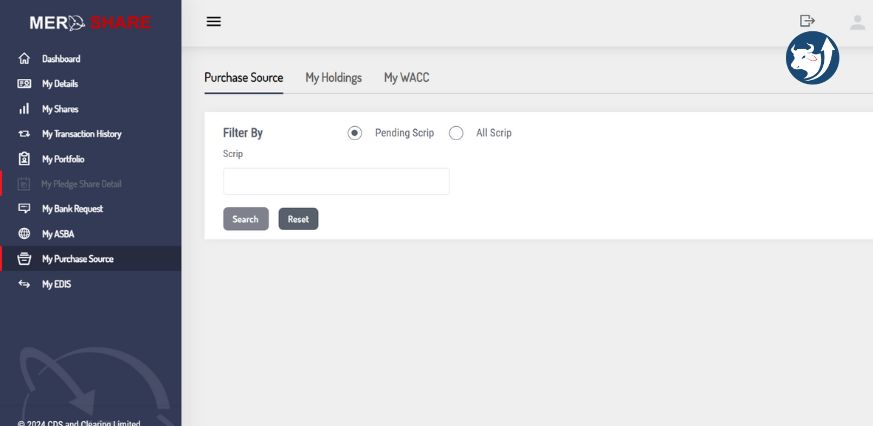
Step 3: Click on ‘Script’ in the Purchase Source field. This will give you a list of companies you own the shares of.
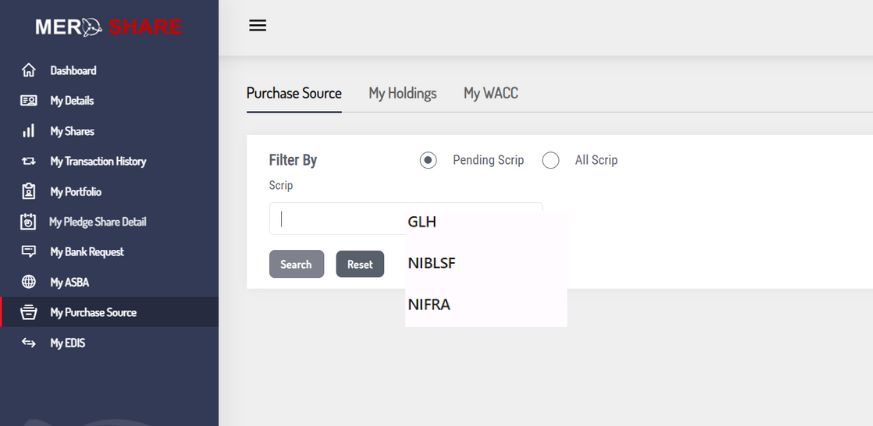
Step 4: Select the company from your list and click on ‘Search’. You will see a screen as shown below.
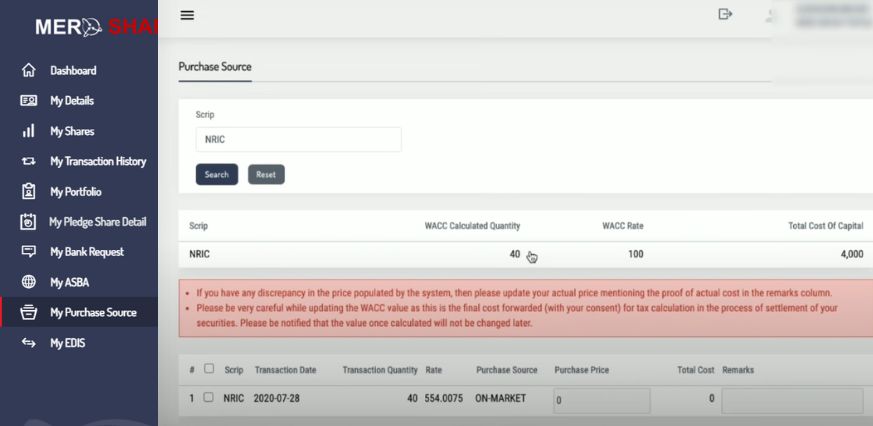
Step 5: Click on the small check box before the company, you will find the WACC of the particular stock under the Purchase Price, then click on “Proceed“.
Note: If the amount differs from what you initially paid for when buying the share, you can enter the actual amount in the ‘Purchase Price’ field. If you do so, you must input your receipt number in the ‘Remarks’ section.
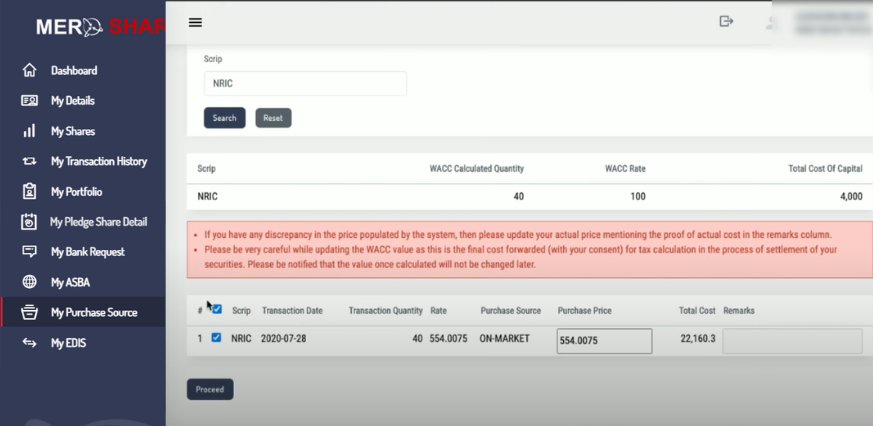
Step 6: Click on the check box to accept the terms and conditions and then click on ‘Update’.
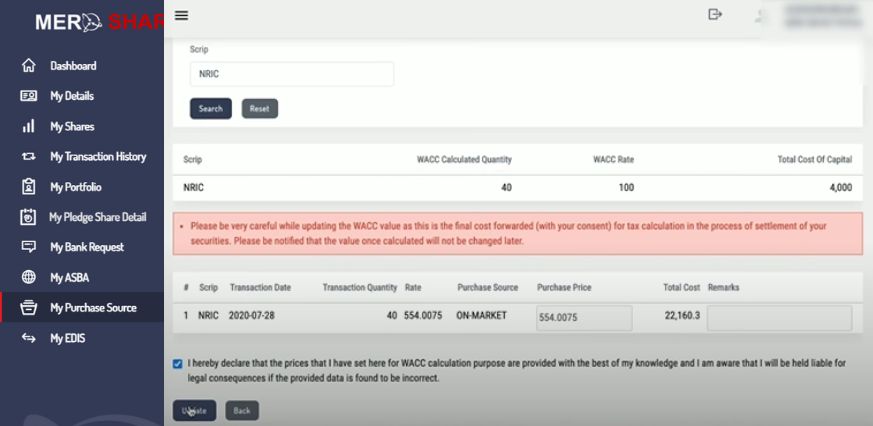
Step 7: You will receive a ‘My Purchase Update’ in a green box on your screen and you will also see the WACC rate for the company you have chosen.
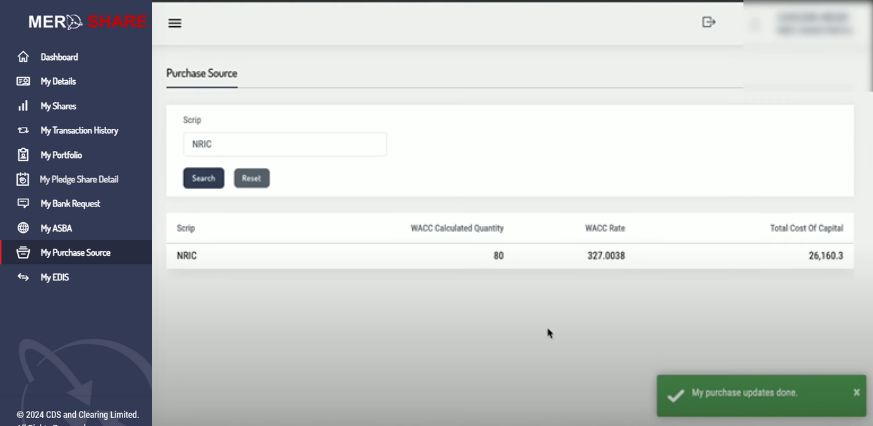
Step 8: After that, you have to calculate the holding days of the particular stock. Click on “My holdings”, select your particular stock under “script” then check the box and click on Proceed.
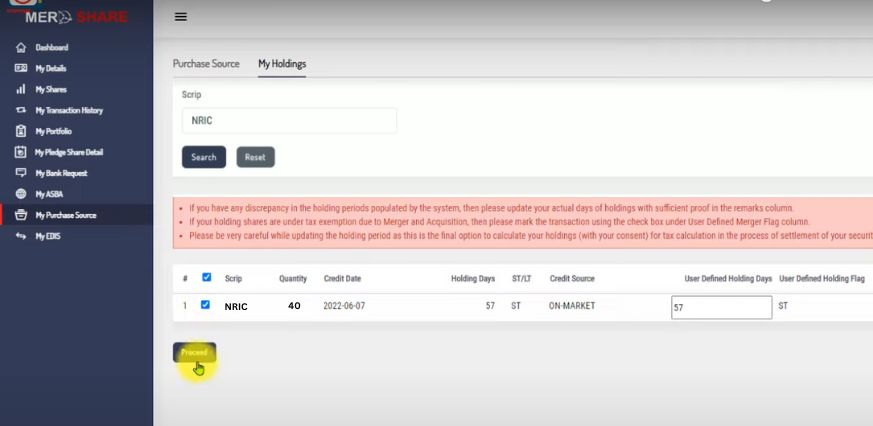
Step 9: Check the box I hereby declare then click on Update.
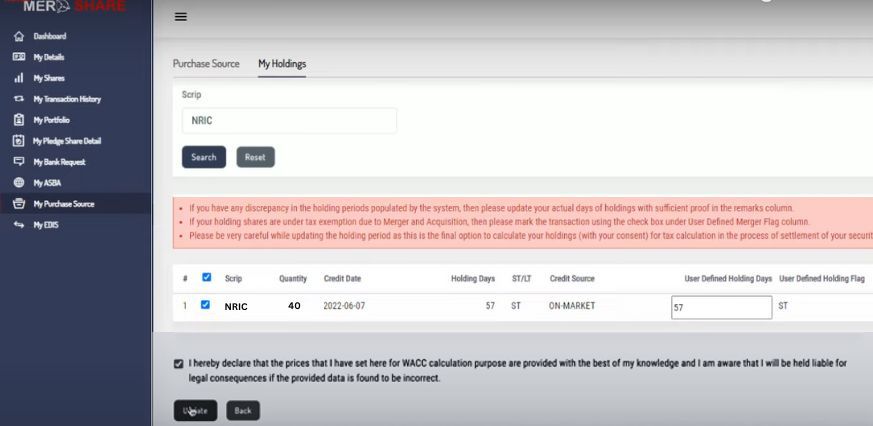
Following this now you have calculated the WACC.
How to do EDIS in Meroshare/ Transfer Shares to Buyers from Mero Share.?
EDIS (transferring shares) is done after the calculation of the WACC in Meroshare. Follow the below steps:
Step 1: Click on “My EDIS” and go to “Transfer Shares” where you will see the below screen. Click on “View detail”.
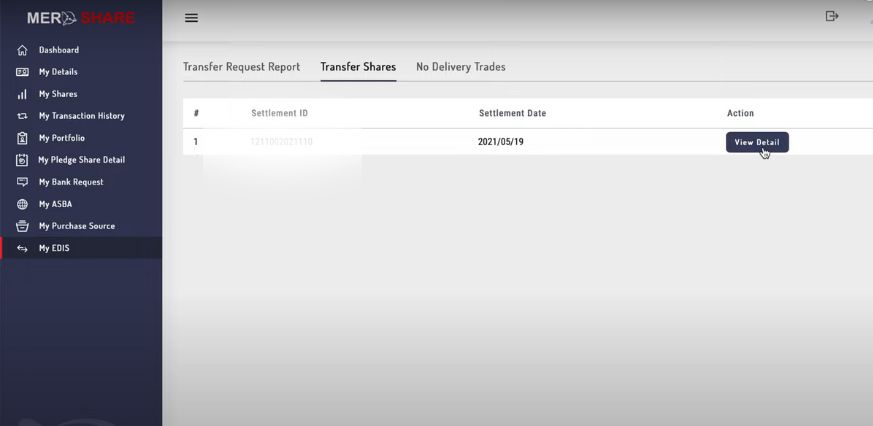
Step 2: You will see a screen as shown below showing the details including WACC. Then click on “Proceed”.
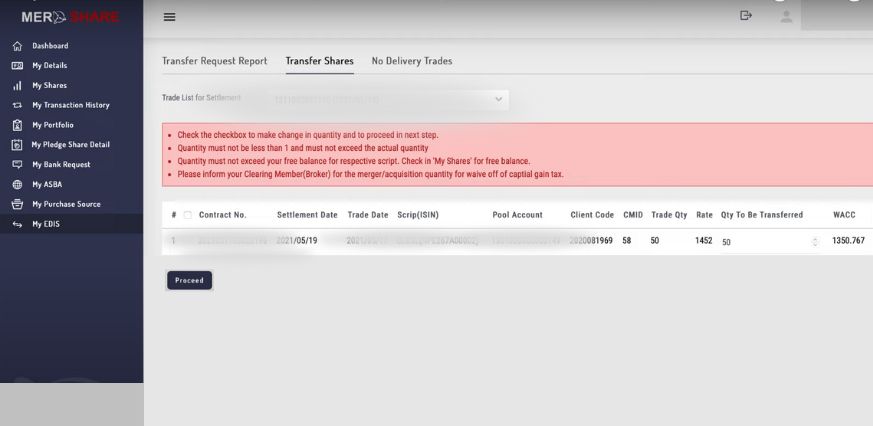
Step 3: Check the box “I agree to deliver” and click “Confirm”.
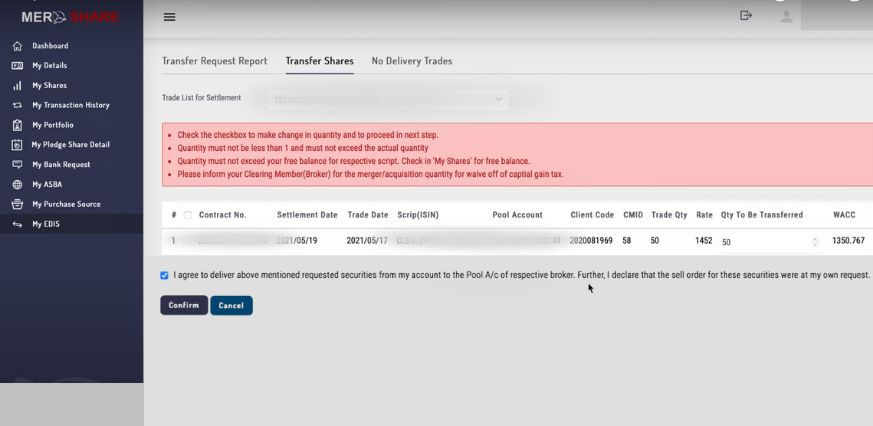
Step 4: You will receive a message “Successfully requested for Transfer share.”
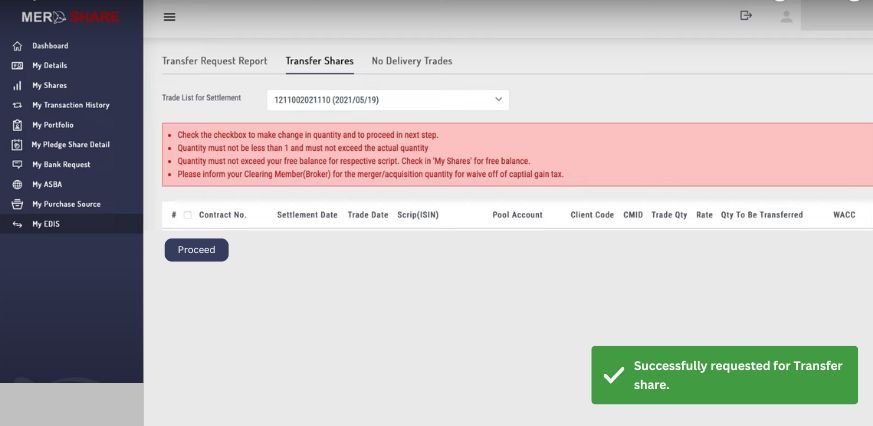
Now you have successfully transferred shares completing the EDIS process.
This article was written to let you know how to calculate WACC using your MeroShare Account. You can calculate WACC on paper too, but you must do it in MeroShare for accurate calculation. And perform EDIS on time so, you won’t be fined for delaying the transfer of shares to the buyer.
You may also like:
- Basic requirements for share trading
- Nepal Share Market: Everything you need to know
- SEBON Preparing to approve a Pipeline IPO that has been stopped for five months
FAQs
Why do you calculate WACC?
WACC will let you know if you have to pay tax on capital gain or not.
How do you calculate WACC after the merger?
The formula to calculate WACC is:
WACC = {(E / V) x Re} + {(D/V) x Rd x (1 – T)}
Where,
E: Equity
V: Sum of the equity and debt market values
Re: Required Rate of return for equity,
D: Stands for Debt
Rd: Required debt cost
T: Current Tax Rate
What is WACC in the market?
WACC stands for Weighted Average Cost of Capital and it is the company’s average after-tax cost of capital from all of the sources including common stock, preferred stock, preferred stock, bonds, and debt.
Can you calculate WACC in MeroShare?
Yes, you can calculate your WACC in MeroShare.
Blogs
Chhyangdi Hydropower Extends Deadline for Rights Share Application | Until 27th Ashad
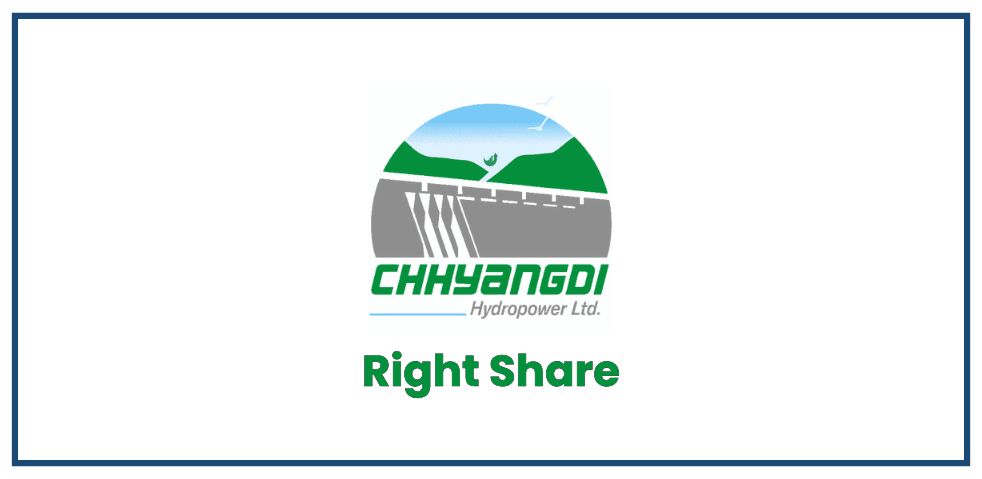
The deadline for the ongoing rights share issue of Chhyangdi Hydropower Limited (CHL) has been officially extended until 27th Ashad, 2082. The issue had originally opened on 23rd Jestha, 2082, with an earlier closing date set for 12th Ashad, 2082.
Key Details of the Rights Share Issue
| Details | Information |
|---|---|
| Total Right Shares Issued | 3,869,775 units (1:1 ratio) |
| Face Value per Share | Rs. 100 |
| Total Issue Amount | Rs. 38.69 Crore |
| Current Paid-up Capital | Rs. 38.69 Crore |
| Post-Issue Paid-up Capital | Rs. 77.39 Crore |
As per the Central Depository System and Clearing Limited (CDSC), 23,503 applicants have applied for 2,317,902 units (worth Rs. 23.17 Crore) as of yesterday.
Eligibility and Application Process
Only those shareholders who held shares before the book closure date of 2nd Jestha, 2082, are eligible for this right share offering.
Interested shareholders can apply through:
- Global IME Capital Limited, Naxal, Kathmandu (Issue Manager)
- Designated branches of Global IME Bank Limited across Lamjung, including Besisahar, Sundarbazar, Bhulbhule, Siundibar, Udipur, and Dordhi
- Any C-ASBA-approved banks and financial institutions
- Online via “MeroShare”.
Applicants are advised to complete the process before banking hours on 27th Ashad, 2082 (Friday).
Important Note:
Payments must be made through an account payee cheque drawn in the name “GICL-BOK-CHHYANGDI RIGHT SHARE”, as per the instructions from Global IME Capital Ltd.
Contact Information
- Chhyangdi Hydropower Ltd
Phone: 977-01-4526483 / 4524925
Email: [email protected] | Website: www.chpl.com.np - Global IME Capital Ltd (Issue Manager)
Phone: 977-01-5970138
Email: [email protected] | Website: www.globalimecapital.com
Notice: Chhyangdi Hydropower Extends Deadline for Rights Share Application
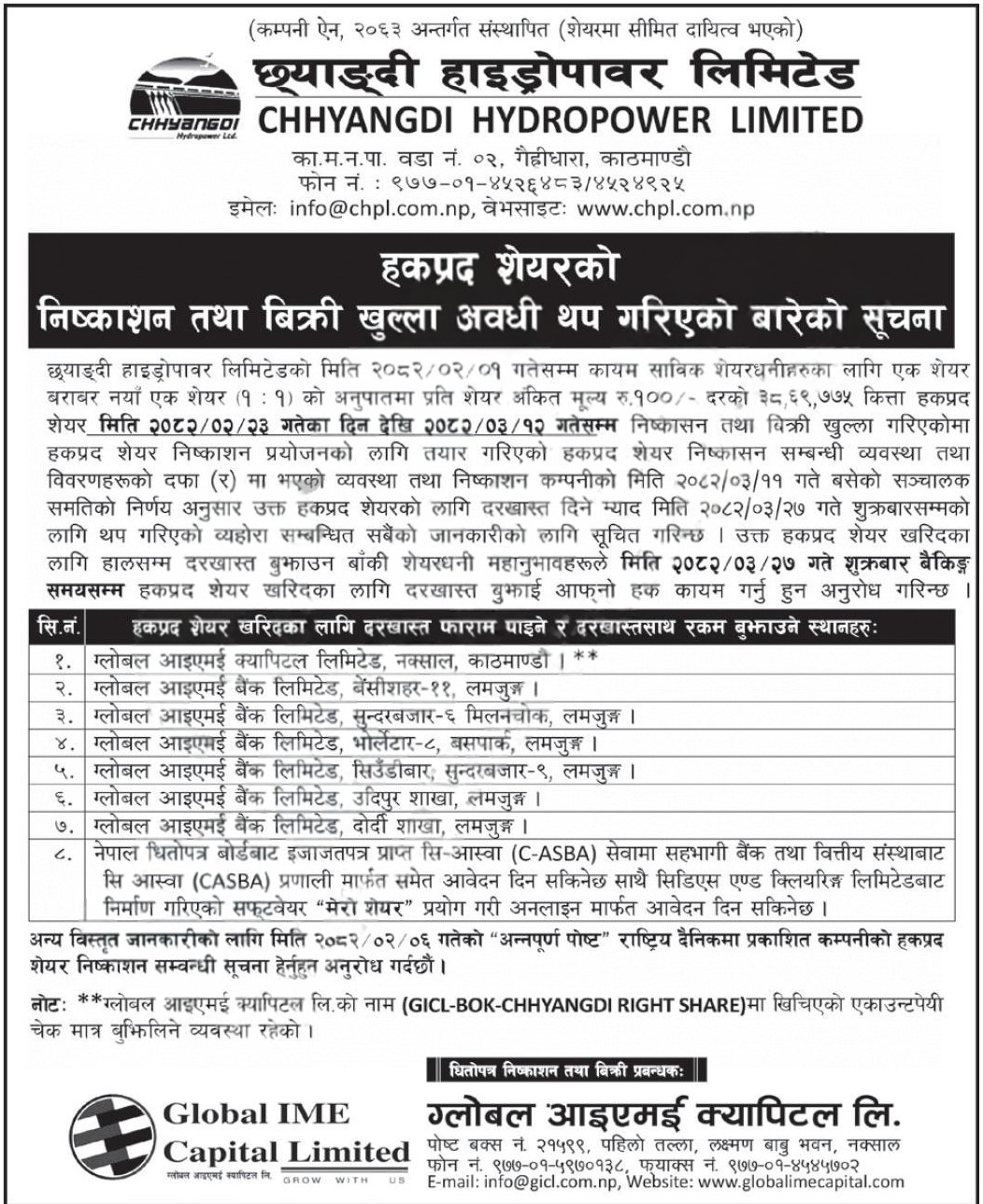
Blogs
Election Commission Preparing to Announce By-Election Date | Voter Registration Now Open
The Election Commission of Nepal has begun preparations for by-elections to fill vacant positions at various levels of government. As part of this process, the Commission is urging all eligible Nepali citizens who have not yet registered their names in the voter list to do so immediately.
According to the Assistant Spokesperson of the Election Commission, Mr. Durga Prasad Chalise, individuals will not be allowed to register in the voter list once the election date is officially announced. Therefore, he emphasized the importance of early registration to avoid being left out.
The Election Commission recently held discussions with the Prime Minister, Mr. KP Sharma Oli, and the Acting Chief Election Commissioner, Mr. Ram Prasad Bhandari. They talked about setting a date for the by-elections. The main focus was on two key areas: Rupandehi Constituency No. 3 for the House of Representatives and Manang Province Assembly Constituency No. 1 (B). Elections in these regions are likely to be held in the second week of Kartik.
The position in Rupandehi became vacant after the passing of Rastriya Prajatantra Party MP Deepak Bohora. In Manang, the seat became empty after provincial assembly member Deepak Manange was sent to jail. In addition to these, more than a dozen ward chairman positions are also currently unoccupied in various local governments.
The Election Commission has issued a public notice dated 2082/03/11 (Nepali calendar) urging all citizens to register in the voter list immediately. The notice mentions that, according to Clause 4(2)(2) of the Voter List Act, 2073, voter registration will be stopped as soon as the election date is declared.
Hence, this is a final chance for anyone who missed earlier opportunities to register. The Commission has made a heartfelt appeal to all brothers and sisters across the country to take this opportunity seriously and get their names included in the voter list.
The Election Commission assures that the upcoming elections will be conducted fairly and freely, in line with its guiding principle:
“Free and Fair Election: Pride of the Nation.”
For more information or assistance, people can visit the official website of the Election Commission at www.election.gov.np or contact their office at Kantipath, Kathmandu.
Notice: Election Commission Preparing to Announce By-Election Date
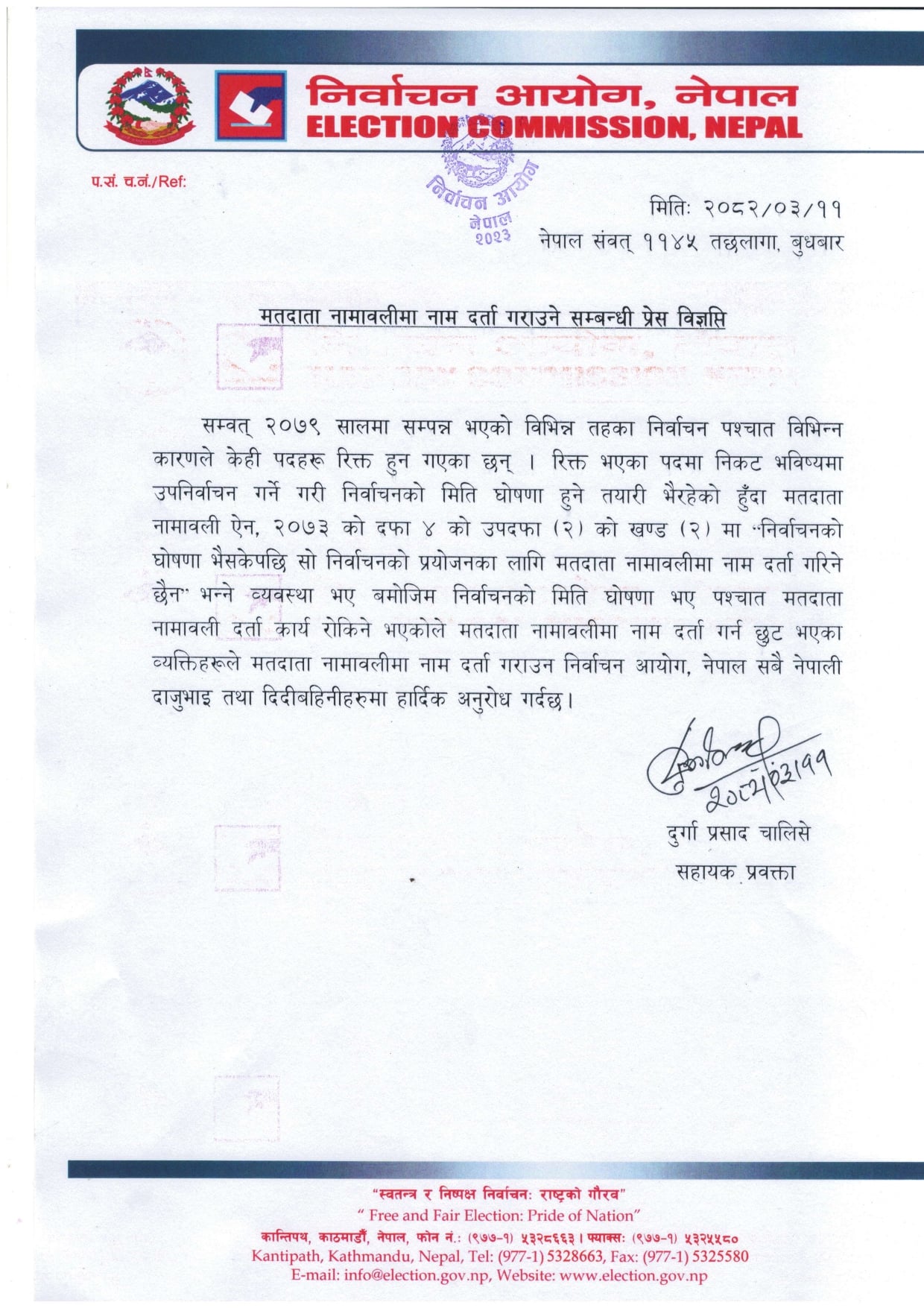
Blogs
Birgunj Customs Office Collects Highest Revenue from Petroleum Imports
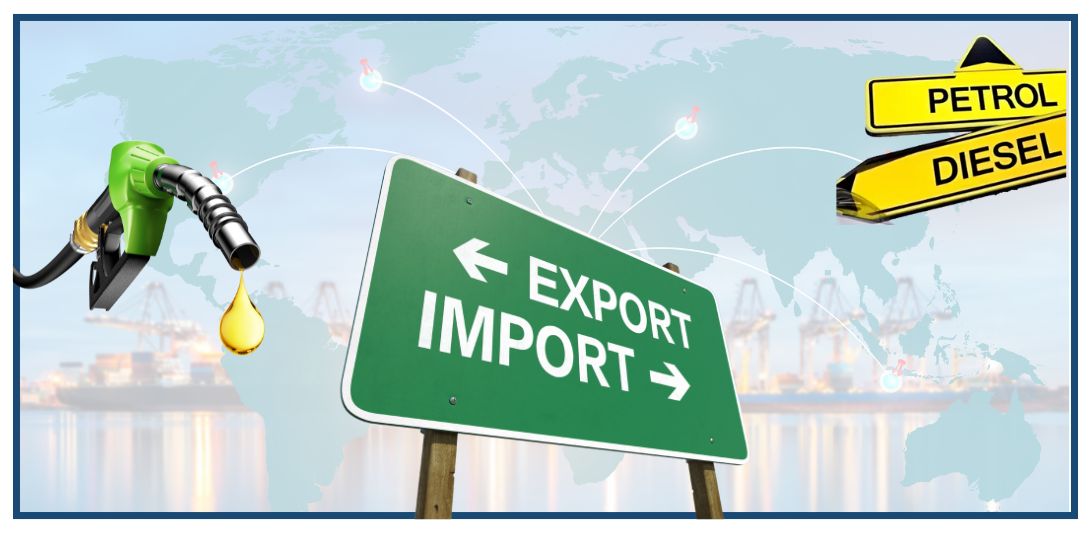
The Birgunj Customs Office has collected the highest revenue from the import of petroleum products in the first 11 months of the current fiscal year 2081/82. According to the office, a total of NPR 73.18 billion was collected in revenue from petroleum imports alone.
During this period, Nepal spent about NPR 174.09 billion to import five different types of petroleum products. These petroleum imports contributed 46.43% of the total revenue collected from the top 20 imported items, making it the most important source of income for the customs office.
Major Revenue Contributors from Imports

What Officials Say
Customs Chief Administrator Deepak Lamichhane stated that petroleum products and vehicle imports are the main sources of customs revenue at Birgunj. He highlighted that these two sectors consistently contribute the highest share of government income collected through imports.
Conclusion
The data from the Birgunj Customs Office shows that fuel and vehicles remain Nepal’s most heavily imported and taxed items. With more than 46% of the revenue coming from petroleum alone, any changes in fuel prices or import volumes can significantly affect national customs revenue.
-
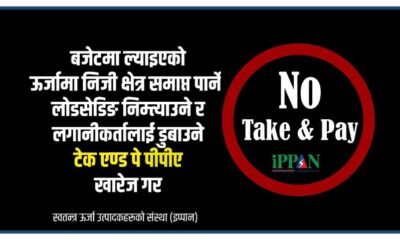
 Blogs4 days ago
Blogs4 days agoPrivate Power Producers Protest ‘Take and Pay’ Provision in Budget
-

 Blogs1 year ago
Blogs1 year agoList of Stock Brokers in Nepal with NEPSE TMS Login – Updated
-
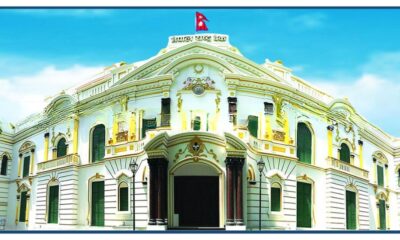
 Blogs4 days ago
Blogs4 days agoNepal Rastra Bank to Withdraw NPR 60 Billion from the Banking System on Monday
-
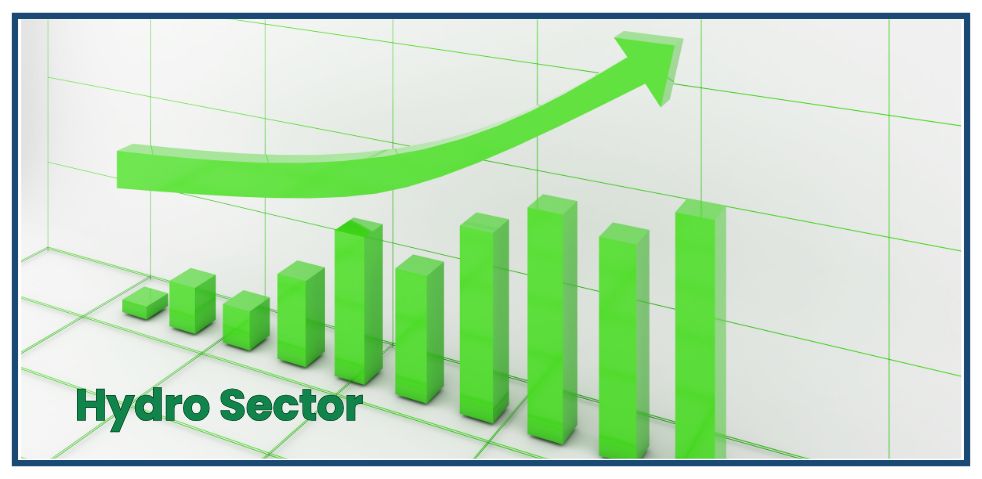
 Blogs1 week ago
Blogs1 week agoHydropower Gains 7.8% in One Month, Outperforming All Sectors
-

 Blogs4 days ago
Blogs4 days agoAsian Life Insurance to Issue Rights Shares from Asar 25
-

 Blogs3 months ago
Blogs3 months agoPure Energy IPO For General Public
-

 Blogs4 days ago
Blogs4 days ago52-Week Low & High Microfinance Shares in Nepal: Current Status and Future Outlook
-
Blogs1 year ago
Broker no. 58: Naasa Securities Co. Ltd.




